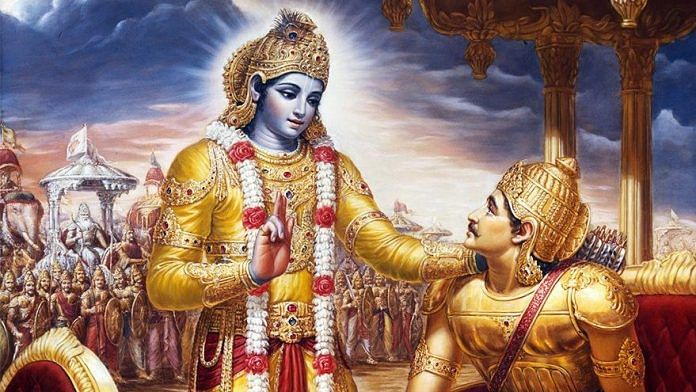The Bhagavadgita is a text about dharma. Did a single person compose it? Were there multiple authors? Was it part of the original Mahabharata or was it inserted later? What kind of darshana and dharma does it espouse? In Essays on the Gita, Sri Aurobindo wrote, ‘I hold it therefore of small importance to extract from the Gita its exact metaphysical connotation as it was understood by the men of the time — even if that were accurately possible. That it is not possible is shown by the divergence of the original commentaries which have been and are still being written upon it; for they all agree in each disagreeing with all the others, each finds in the Gita its own system of metaphysics and trend of religious thought.’
Books and papers are still being written on the Bhagavadgita, subjecting it to analysis and vivisection, seeking to answer the kinds of questions I have mentioned. Though taken out of context, these attempts remind me of Adi Shankaracharya’s bhaja govindam stotram — भगवद्गीता किञ्चिदधीता: ‘Such people have read a little bit of the Bhagavadgita’ and analyse the text as an external object. However, the Bhagavadgita isn’t about such external objects and entities and about relationships between the individual and the external world. Who am I? Why am I here? Where will I go? These are perennial questions. The first shloka of the Ashtavakra Gita asks them much more directly than the Bhagavadgita does. कथं ज्ञानमवाप्नोति कथं मुक्तिर्भविष्यति। वैराग्य च कथं प्राप्तमेतद ब्रूहि मम प्रभो॥ Janaka asks Ashtavakra, ‘O lord! How can knowledge be obtained? How does emancipation result? How does one achieve non-attachment? Please tell me that.’
It is perfectly possible that we spend our lives without seeking to answer these questions; indeed, perhaps even without ever asking them. But if we do, the Bhagavadgita provides answers, and each person who delves into the Bhagavadgita finds his/her own answer. But that answer comes through self-reflection and introspection, not through analysis and vivisection. Self-reflection and introspection require silence and are rarely achieved through pontificating and writing. Notice how the Bhagavadgita repeatedly uses the word muni, with the same etymological root as silence.
For example, in 2.69, या निशा सर्वभूतानां तस्यां जागर्ति सं यमी | यस्यां जाग्रति भूतानि सा निशा पश्यतो मुने:|| All of us possess bodies, minds and hearts. Ideally, these three should be in equilibrium, but never are. When the body predominates, one is drawn towards karma yoga. When the mind predominates, one is drawn towards jnana yoga. When the heart predominates, one is drawn towards bhakti yoga. But these aren’t three separate paths and I also find attempts to straitjacket the Bhagavadgita into these silos extremely sterile.
In a specific context, Swami Vivekananda wrote that everything in the Bhagavadgita could be summarized in what 2.3 states. क्लैब्यं मा स्म गमः पार्थनैतत्त्वय्युपपद्यते। क्षुद्क्षुरं हृदयदौर्बल्यं त्यक्त्वोत्तिष्ठ परन्तप।। That is indeed true. Delving into the Bhagavadgita, we too will lose our lassitude. Like Arjuna in 18.73, नष्टो मोह: स्मृतिर्लब्धा त्वत्प्रसादान्मयाच्युत | स्थितोऽस्मि गतसन्देह: करिष्येवचनं तव || You don’t necessarily have to read this particular translation. But if you read the Bhagavadgita, you will find your own answers.
Also read: Ambedkar and Gita: There is a reason why Narendra Modi will never mention them together
This excerpt from The Bhagavadgita translated by Bibek Debroy has been published with permission from Penguin Random House India.




Perhaps you don not know Economist was /is called dismal science by many scholars. Nothing immoral or denigrating for any common man or scholar to read and propagate religious or spiritual books. Economy is like moon it grows and wanes. Most rich nations/ empires emerge and become extincts. Whether you agree or not India was once upon a time a big economy and can be /will be bigger economy. Do not lose hope.
A member of the economy think tank to the PM is busy writing and promoting books. No wonder our economy is in a mess.